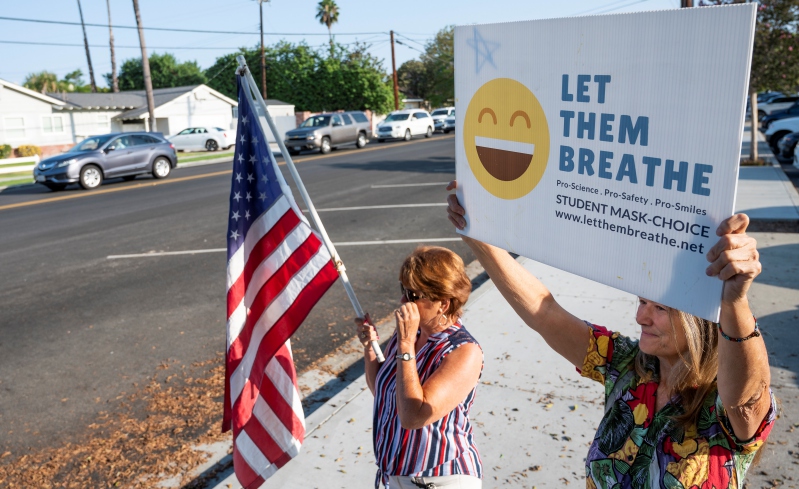
Anti-mask rhetoric in K-12 schools demonstrates how public insults can limit the effectiveness of civil rights law.
The use of public insults and misinformation by the political right has acted as both a headwind and deadweight against the achievement of structural civil rights reform. These tactics act as a headwind by making it difficult to build effective remedies into a statute, and then, after the statute is enacted, they act as a deadweight to make it difficult to enforce the limited set of remedies that exist. To withstand the force of this public insult playbook, it is important for civil rights statutes to have strong, structural enforcement mechanisms rather than neo-liberal, one-person-at-a-time kinds of remedies.
The current “masking wars” in K-12 classrooms provide an excellent example of the tension between the rights of disabled students, who need masks to be worn in the classroom for their own safety, and the use of public insults and misinformation to impair access to those rights.
Anti-masking groups have mobilized by using the power of insults and misinformation, and even physical violence, to impart their message. Superintendents have reported shouting matches at school board meetings with a mask being ripped off a teacher’s face. The New York Police Department reportedly stated that a masked Asian woman was attacked in a subway station by two men who called her “diseased,” suggesting that those who try to wear masks to protect public health are, themselves, members of a disfavored disability group. Caught in the middle have been students with medical conditions that cause them to be at heightened risk of adverse effects from COVID-19.
The headwind effect of insults has historically limited the rights available to students under disability law. The anti-mask insults add to the deadweight effects that have made it hard to use the limited sets of legal rights available to individuals with disabilities. Negative stereotypes against people with disabilities have limited the enforcement scheme under the Americans with Disabilities Act (ADA). The ADA’s narrow reasonable accommodation requirement and broad undue hardship defense limit the affirmative tools available for employees with disabilities.
The Job Accommodation Network has found that the typical employer provides only minimal accommodations for employees with disabilities—at an average cost of less than $500. Moreover, these accommodations are only made on a case-by-case basis for individual complainants; they do not result in more structural changes that could both better meet complainants’ needs as well as help others in the same workplace.
As law professor Doron Dorfman has documented, “the public is suspicious of disability and various types of rights for people with disabilities, believing that the disability con is prevalent in multiple contexts.” It is broadly accepted that the ADA has done little to improve employment outcomes for people with disabilities because of its lack of structural impact.
Another important disability statute—The Individuals with Disabilities Education Act (IDEA)—has the same kind of built-in limitations, again because of negative stereotypes about people with disabilities that the U.S. Congress embedded in the statute from its inception. IDEA’s proponents argued for a broad definition of disability and a vigorous enforcement scheme, but negative stereotypes about children with disabilities caused Congress to enact a limited, parent-driven enforcement scheme for a chronically underfunded statute.
Like the ADA, IDEA codified a one-person-at-a-time enforcement scheme that was unlikely to attain effective, structural reforms.
Fast forward to the COVID-19 pandemic, the United States Department of Education has highlighted that school closures and the move to online education have had a disparate impact against groups that were already facing educational disparities, including students with disabilities. Aware of the deficiencies of online education, nearly all school districts in the fall of 2021 embraced the American Academy of Pediatrics’s (AAP) recommendation to return to in-person education because “the benefits of in-person school outweigh the risks in almost all circumstances.”
AAP’s universal masking recommendation, however, did not receive an enthusiastic response. A pernicious masking and vaccine public misinformation campaign has persuaded many parents to disbelieve the effectiveness of masking and vaccines. Although national data show enormous regional variation, 54 percent of parents of school-age children disapproved of a vaccine mandate even if the FDA approved a COVID-19 vaccine for use with children. Only 63 percent of parents approved of a mask mandate for unvaccinated students and staff.
The availability of the COVID-19 vaccine for children has not been met with the same “wild enthusiasm” that the polio vaccine for children received in the 1950s. Not surprisingly, some governors and state legislatures caved to anti-vax parents and began to ban local school districts from imposing mask mandates.
The federal government and some parents are trying to fight back against these refusals to require masks for the protection of the whole community, including the protection of students with medical conditions that put them at heightened risks from COVID-19. But their efforts are dragged down by the limited—sometimes ineffective—enforcement options in disability laws.
Admittedly, parents of a child with a medical condition who is particularly negatively impacted by COVID-19 can bring a lawsuit against their school district to insist that all children in the classroom mask as a safety measure. Such lawsuits are analogous to successful lawsuits involving children with allergies to foods such as peanuts. School districts create no-peanut rules to allow such children to attend school safely. Because it is easier to enforce a mask mandate than search through children’s lunch boxes, a mask rule should be even easier to implement than a peanut ban.
Even though such an individual lawsuit would likely be effective, a school could comply with such a lawsuit by only requiring masking for the children within that child’s classes or, at most, the whole building. A court would be unlikely to be able to issue an order that would be system wide. And the parental hostility to mask wearing would likely make many school superintendents wary of doing more than the minimum required by a court order.
Parents could band together to bring class-action lawsuits against a governor who has banned mask mandates. But even with a court victory—which is highly likely—the result would merely enable local school districts to impose mask mandates. Many districts might still choose not to do so. And these lawsuits are only possible in the few states where governors or legislatures have outright banned masks.
The most promising option would be for the federal government to take an aggressive enforcement role. Earlier this month, U.S. Secretary of Education Miguel Cardona announced the Education Department’s responsibility under disability law “to investigate any state educational agency whose policies or actions may infringe on the rights of every student to access public education equally.” Cardona mentioned a range of enforcement positions from narrow case-by-case actions to broad, state-wide ones. The broadest approach would be more effective than the comparatively limited approaches available to parents because it could result in a state-wide order to mandate masks in all schools.
In response to this federal position, Florida Governor Ron DeSantis has used some of the classic tools in the public insult playbook. Rather than comment on whether masks and vaccines are effective, he shot back with “why don’t you do your job, why don’t you get this border secure and until you do that, I don’t want to hear a blip about COVID from you.”
DeSantis’ assault seems to have been somewhat effective because, in a conciliatory tone, Cardona responded, “At the end of the day I want to work with … Florida. I want to make sure those students have access to in-person learning.” He did not say, “We’ll see you in court.”
Whether Cardona is willing to use the breadth of his authority to enforce mask mandates around the country remains a political challenge. The heavy hand of the public insult playbook stands as a deadweight to the federal government’s use of its unique enforcement power. But federal enforcement power is one of the only available tools to overcome the power of anti-mask insults and misinformation.




